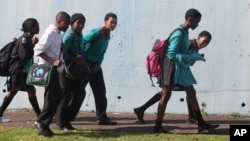Does two plus two equal five? A staggering number of South African students couldn't say for sure, because of poor standards for math education. That became obvious earlier this year when the government released the nation's dismal graduate exam rates. Across the nation, educators are trying to find out why South African students perform so poorly in science and math - and to figure out how to fix it.
You don’t have to be a mathematical genius to see that South Africa has a math problem. The World Economic Forum recently ranked the nation dead last in a global scorecard of math skills.
South Africa’s government disputed the ranking of 148 -- out of 148 -- but no one disputes the numbers are grim. The nation’s basic education department found that last year, just three out of a hundred students earned a score of higher than 50 percent in mathematics.
Why does math matter, anyway? Don’t ask the University of Johannesburg’s Professor Elizabeth Henning unless you want to be lectured.
Spitfire-style, she ticked off a number of problems ailing South Africa, among them: the nation’s failing power grid, water management issues, a lack of skilled workers like engineers and doctors, and the myriad challenges of transportation and food production. All of these problems, she says, can be traced to poor scientific and mathematical education.
“I can go on and on and on.… You name it. We need scientists, we need kids, - even if they don’t become scientific at all - who have a scientific view of life. Kids who can manage their immediate world because they have a scientific view of life,” says she.
Henning heads the university’s Center of Education Practice Research and does early education research at the university’s lab school for young children.
Myriad causes
South Africa’s problems with math, she says, have many causes - among them, the longstanding system of racial separation that put entire generations of students at a disadvantage. Another factor, she says, is that teachers are poorly equipped to teach math and often fall back on rote-learning methods.
The lab school, on the university’s Soweto campus, tries to start from zero. Getting students interested in math during their single-digit years, she says, has a big impact on their prospects in South Africa’s graduate exams, called the matric.
“Here’s my mantra: matric begins in Grade One. It begins in Grade One, so what you are finding at the end of matric is just an end product of what began in Grade One,” says Henning.
Separately, educational nonprofit Numeric coaches about 1,500 middle school-age students in math, through their website and in programs in Johannesburg and Cape Town.
Andrew Einhorn is the company’s chief executive officer. He says the nonprofit also focuses on the adults in the equation: the teachers.
“I think the root of the problem is probably at the teacher training level. So you have a situation where it’s sort of a cycle where you have a generally weak caucus of maths teachers (South African parlance prefers maths over math), and they raise their learners, they sort of grow up and become the next generation of fairly weak maths teachers. And this sort of cycles around. And, someway, you need to break that cycle,” says he.
Einhorn says he thinks things are improving and credits South Africa’s government for putting more emphasis on education. He also says he’s seeing parent enthusiasm slope upward.
“I’m increasingly optimistic about where South African maths will go in the next 10 to 15 years. I see increased interest from parents, and actors sort of pushing for opportunities. There are increasing number of people trying to get into the teacher training programs, which means that the universities are able to be more selective about the quality of applicant that they bring in,” says Einhorn.
Educators and officials, however, say the problem at hand is one with many variables and could take decades to solve. Math illiteracy sometimes seems pervasive in South Africa, with even the education minister publicly flubbing a particularly easy subtraction problem when announcing exam results earlier this year.
And innumeracy goes up to the highest levels. President Jacob Zuma elicited laughter during a speech in 2014 when after attempting to read out the figure 939,360,000, he opted for the simpler “close to a billion.”




